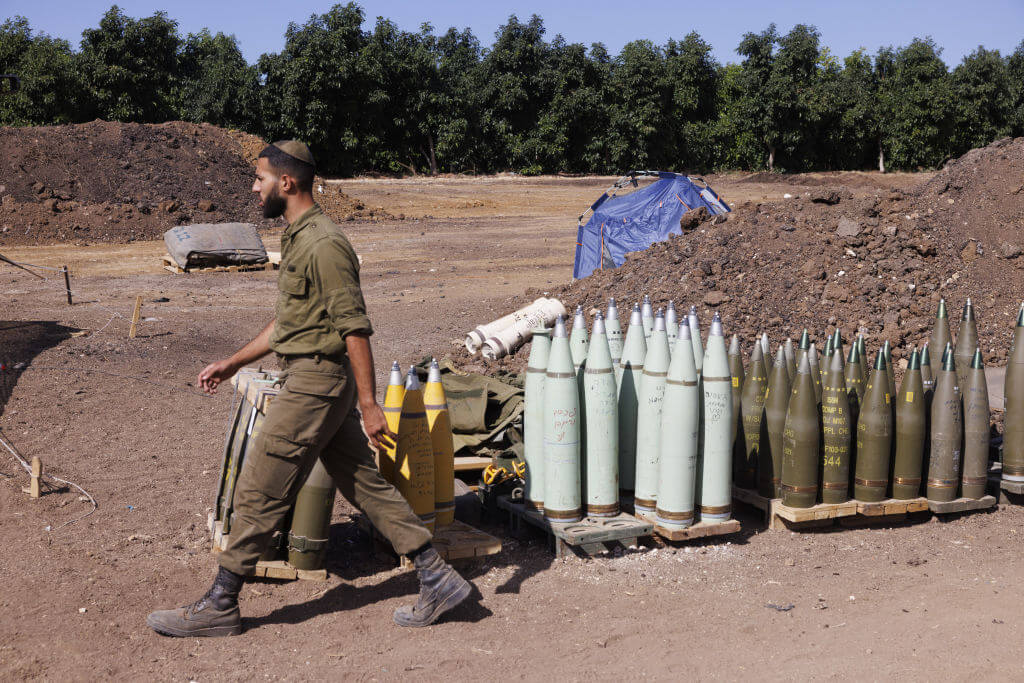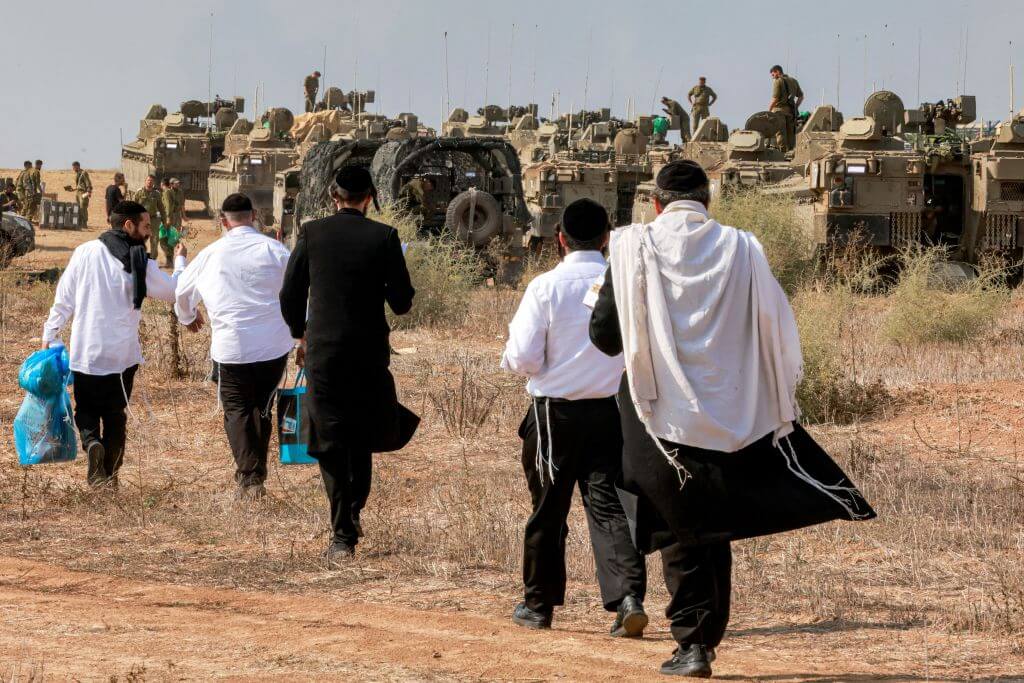Are Haredi Jews in the IDF the new normal?
‘Sitting at home is the worst thing you can do in these times,’ said Ari Goldberg, a Haredi reservist who joined the IDF last month

A soldier near the border with Lebanon Nov. 10. Photo by Kobi Wolf/Bloomberg via Getty Images
Since Hamas’ Oct. 7 attack on Israel, hundreds of Haredim have enlisted in the Israel Defense Forces, a phenomenon widely celebrated as a milestone in the integration of the community into Israeli society.
Yoav Gallant, the Israeli defense minister, likened the enlistments to the bravery of Nachshon ben Aminadav, lauded in the Talmud for his unwavering faith as the first to leap into the Red Sea before God stilled and parted the waters. Israel’s opposition leader, Yair Lapid, suggested that these Haredi soldiers could build a foundation for a center-left government that includes Haredi parties.
In recent weeks some 360 Haredi men, of more than 3,000 applicants, have concluded two weeks of basic training and joined the IDF’s reserves. Israel mobilized about 360,000 reservists after Hamas killed more than 1,200 people in Israel last month, and kidnapped more than 330.
Most of the Haredi volunteers are 26 and over: Yeshiva students and Haredi women 26 and younger are generally exempt from military service under a decades-long arrangement that allows them to study Torah instead of serving. Arab, but not Druze, citizens of Israel are also exempt from mandatory military service, which begins at 18 for both men and women.
Many Israelis have noted how Haredi rabbis have refrained from criticizing those who have signed up. The Haredim considered Torah study essential for young men, and Haredi leaders in the past have insisted upon the exemptions, even as other Israelis have denounced the group for shirking military service.
Ari Goldberg, a 33-year-old Haredi social worker and therapist who has served in the reserves since Oct. 23, said his community supports him.
Originally from Brooklyn and a former student of Yeshivat Mir in Jerusalem, Goldberg said the horror of Oct. 7 moved him to join. “Sitting at home is the worst thing you can do in these times,” he said. “I felt like I had a skill in terms of being able to provide support and to contribute.” He is one of 130 new mental health officers recruited by the army in recent weeks.

Goldberg said that after he enlisted, he received inquiries from at least 10 Haredi friends who were considering doing the same. Some of them followed through and applied. “People were definitely inspired,” he said, adding that he hopes more like him will step forward.
For its part, the IDF is trying to make the Haredi feel welcome by making sure their working conditions — from the food they are served to the opportunities they are given to pray — are mehadrin, in strict accordance with Jewish law.
But as some herald a new era of Haredi integration into the larger Israeli society, others familiar with the community explain their enlistment as a response to a particularly harrowing terrorist attack — but not a harbinger of a sustainable shift. Still others point out that Haredim, while not in uniform, have long had their own way of supporting Israel — from rushing medics to the scene of terrorist attacks to supplying meals to the families of soldiers — and that IDF sign-ups are not a realistic measure of their commitment to other Israelis.
A mindshift?
Yitzik Crombie, a Haredi high-tech entrepreneur from Kfar Chabad who helped organize the recruitment, said it represents a remarkable change in attitude within the Haredi community and that IDF commanders have appreciated their enthusiasm.
Israel’s fast-growing Haredi community makes up about 13% of the country’s population, and is expected to grow to 20% by 2033. Because of their exemption from military service and commitment to Torah study, they are often unprepared to enter the workforce. Their isolation from other Israelis is exacerbated by directives from prominent rabbis and Torah scholars against watching television and using smartphones, which they deem threatening to their way of life.

Crombie is one of several Haredim working to build bridges between them and other Israelis. The author of a recent book, titled When the Haredi Will Become the Majority, he has worked with several Haredi nonprofits to build employment initiatives, and aims to show Israelis that the nation is stronger when the most strictly observant are encouraged to work and serve.
“Individuals are challenging the perception of being outsiders,” he said. To date, three cohorts of 120 Haredi have completed their basic training and are now reservists.
Crombie noted that Haredi who have enlisted in the past few weeks tend to come from working-class families, as opposed to those affiliated with yeshivas and kolels (Jewish scholarly institutes). That may explain the minimal pushback from rabbis, who know that they are likely not losing a potential scholar to the military.
Israel Cohen, a Haredi journalist and political commentator, called the willingness of so many Haredi in the workforce to become soldiers as well represents a significant shift within the community. “It has been legitimized and even appreciated,” he said.
In future, Crombie said non-Haredi citizens and secular parties will determine whether Haredim will continue to feel that they will be respected in the IDF.
Yohanan Plesner of the Jerusalem-based Israel Democracy Institute said Haredi men who sign up for the IDF are expressing an “authentic interest” in integrating within Israeli society. In 2012, he headed a committee tasked to create a universal draft that would include both Haredi and Arab citizens. It was later disbanded by Prime Minister Benjamin Netanyahu to placate his more religious coalition partners.
‘Not actual military service’
But some have warned against concluding that recent Haredi enlistment heralds a wholesale change in the group’s attitude toward military service.
Some Haredim have expressed their disapproval violently. A group of Haredi extremists in the central city of Bnei Brak last Monday attacked a Haredi reservist soldier, surrounding his car and overturning trash cans to block his way. And earlier this week, a rabbi sparked controversy by equating IDF soldiers to “garbage collectors.”
Tali Farkash, a Haredi columnist for the Israeli online publication Ynet, said the recent Haredi signups appear more like a spontaneous reaction to the war rather than a sustainable departure from tradition. “It’s not actual military service,” she said. The Haredim soldiers are not required to serve, and their two-week training is a very abbreviated version of what other soldiers must go through.
And the lack of protests from Haredi rabbis? That indicates that the enlistees aren’t breaking ground, and don’t speak for all Haredim,” she said. “These individuals, already established in the workforce, represent a more moderate faction within the Haredi society.”
“The younger generation within the Haredi community seemed resistant to embracing the army,” Farkash added. “The prospect of enlistment in the coming years doesn’t align with their beliefs. It simply isn’t acceptable.”
Grilling for 500
While the Haredi eschewal of military service is well known, the ways in which they support soldiers and Israeli victims of terrorism are often not. Since Oct. 7, Haredi medical service and emergency responder groups — like United Hatzalah and ZAKA — have led rescue and recovery efforts at kibbutzim and other targets of Hamas.
Others have mobilized to deliver food and essential equipment to reservists and displaced families.
Last week, I traveled with a dozen Haredi men to an IDF base in the south, close to the border with Gaza, where they prepared dinner for soldiers between shifts fighting in Gaza.
The Haredim, affiliated with a group called Ezer LacChayal, which translates to “help for soldiers,” grilled about 500 portions of chicken cutlets, kebabs, turkey chops, and minced beef, which they scooped into pita pockets and served with hummus, roasted tomatoes and peppers, and salad. After dinner the group danced with the soldiers, and a Chabad emissary from France distributed new tefillin bags.
The group’s founder, Eliyahu Guttman, a member of the Chabad who completed three years of IDF service after marriage, said he and other Haredim were there to “combine yiddishkeit with welfare — providing nourishment for both the body and the soul.”
Guttman said Ezer LacChayal had 40 active members before the war and now has 450 volunteers. It grew out of his work as a soldier to cultivate Judaism among other soldiers during his free time. Now he said, backed by his wealthy family, he is visiting soldiers in bases around Israel and helping to support them and their families with food and other assistance. “This is our way of demonstrating love to Am Yisrael,” he said, using the Hebrew phrase for “the people of Israel.”
‘We have all changed’
One Haredi volunteer, who has distributed protective gear to IDF soldiers and spoke on condition of anonymity to express his views freely, said Haredim feel a sense of guilt because they don’t share the burden and risks of military service with other Israelis. Those who are joining the military are attempting to compensate for this perceived lack of contribution, he said.

Cohen, the Haredi journalist, who is a host on the popular Kol Berama radio station, said the surge in enthusiasm for military service is genuine, but will likely subside. And Haredi leaders who refrained from publicly expressing their displeasure, he predicts, may voice their concerns in future. Still, he said, those Haredi who want to serve and better integrate into the larger society will feel less inhibited than they did before the war.
“We have all changed,” Yair Lapid, Israel’s opposition leader and head of the centrist Yesh Atid Party, posted on X (the platform formerly known as Twitter) on Nov. 16. He described meeting Haredi who had volunteered to support soldiers, and seeing the lines of young Haredi men who themselves wanted to be part of the IDF. “What was will no longer be,” he wrote.
Farkash, the Haredi columnist, said politicians are cautiously reaching out to the group, because they recognize the power they wield at the ballot box. “This alignment seemed more strategic than reflective of a genuine ideological shift,” she said.
A message from our Publisher & CEO Rachel Fishman Feddersen

I hope you appreciated this article. Before you go, I’d like to ask you to please support the Forward’s award-winning, nonprofit journalism during this critical time.
We’ve set a goal to raise $260,000 by December 31. That’s an ambitious goal, but one that will give us the resources we need to invest in the high quality news, opinion, analysis and cultural coverage that isn’t available anywhere else.
If you feel inspired to make an impact, now is the time to give something back. Join us as a member at your most generous level.
— Rachel Fishman Feddersen, Publisher and CEO






















